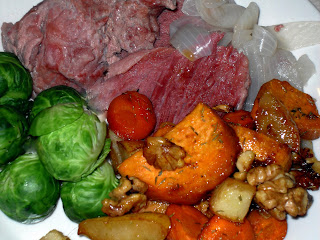 Whether as a means of inspiration, or a sense of some manner of purpose, it can be tempting to romanticize the lives of our forebears. Of this folly, I find women, in particular, are often guilty. We use romantic versions of nearly every lifestyle choice to bolster our spirits and convince us that we're doing the right thing, whether that thing is conquering a board room , raising a family or, perhaps most often, being a housewife.
Whether as a means of inspiration, or a sense of some manner of purpose, it can be tempting to romanticize the lives of our forebears. Of this folly, I find women, in particular, are often guilty. We use romantic versions of nearly every lifestyle choice to bolster our spirits and convince us that we're doing the right thing, whether that thing is conquering a board room , raising a family or, perhaps most often, being a housewife.What's the harm, one might ask. On the surface, there is no harm at all. It's good to have rolemodels and hero(ine)s. Reaching for a time-honored ideal couldn't ever be bad, right? Wrong. It can be very bad. You see, the past has never been as glamorous as we might want to believe.
There are a few eras which fall prey to the Romantic Flaw more than others, but amongst many homesteaders, Victorian times get the worst of it.
It's not our fault, really. Unless we have researched extensively, all we know of the age is fed to us through upper middle-class tales of flowing petticoats, summering in the country, gathering eggs from a sunlit field, and receiving guests in our fire-warmed parlors. We envision hardwood kitchen islands covered in seasonal produce, freshly baked goods, and being surrounded by polite children studying embroidery, tending the gardens, and dutifully following their parents' command.
In 1999, UK Channel 4 produced a mini-series reality experiment in an attempt to dispel at least of few of these myths. The 1900 House was the three-month chronicle of a typical British family sent to live exactly as they would've in the year 1900, at the tale end of Victoria's reign.
The military family of six moved into a spotlessly recreated 1900s London townhouse and were forbidden from employing any modern knowledge or tools for the duration of the show. The husband wore a period uniform, shaved with a straight razor, and was charged with tending the fire in the family range. The children had to learn to occupy themselves with quiet hobbies and a lack of social life, as well as stodgy, utilitarian food which left the young son fully non-plussed. Then, there were the women.
The mother of this tribe soon learned who got the rawest of deals during these post-Dickensian days. For the first month, she arose at dawn and began cooking the porridge, fielding door-knocking merchants offering their goods, ensuring the children were occupied, and beginning her daily cleaning which, in a coal-fired soot-filled home, was a non-stop effort. Laundry, boiled in baking soda water, took three days to fully complete. The state-of-the-art cooker often failed, meaning a roast might take 6 hours, and hot baths were but a mere dream. Family swimming fun was off-limits to her during her "curse" time, and life was a sour-making, grumpy chain of drudgery...until she pawned it off on someone of a lower class.
Those halcyon days of yore were anything but—choked with pollution, poverty, and inequalities we've long since forgotten. There were moments, of course. Moments of perfectly genuine bliss, at least for those of middle class or higher. And I'm certain that those of even the poorest ranks learned to laugh past the hunger, maltreatment, arthritis, and illness.
While taking lessons from this era can bring a needed knowledge to modern times, don't try to recreate the idealized vision of the past. You will falter and fail, and may even resent yourself for an inability to keep up with this romanticized version of days gone by. Instead, enjoy your modern freedoms. Savor the time gifted to you by washing machines, microwaves, and refrigerators. Thank the stars above that you may choose to live as basic or as complex as you wish, and that no man, woman, nor tome of proper household management can set you off your path.
Live genuinely. Live uniquely. Live presently. It's all we've got. And give the 1900 House a few hours of your time. It's well worth it.







 1/8 pumpkin or squash
1/8 pumpkin or squash

 1 sweet potato, sliced thickly
1 sweet potato, sliced thickly




